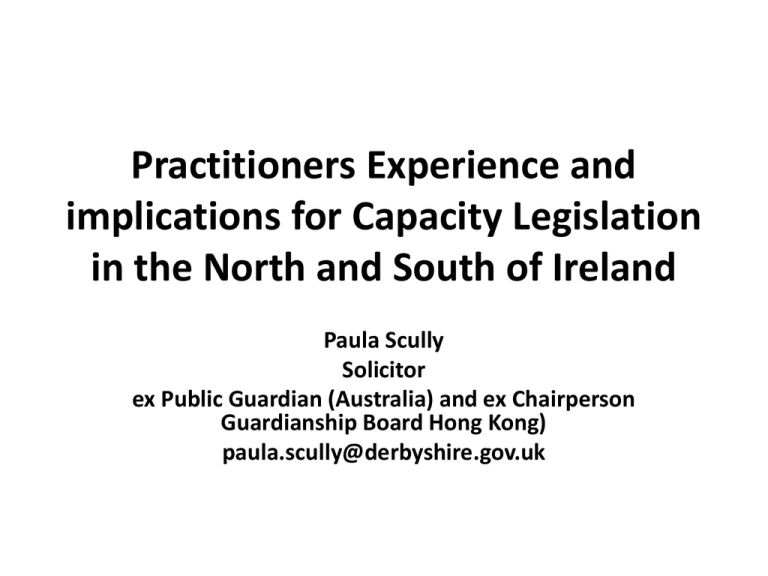
Practitioners Experience and
implications for Capacity Legislation
in the North and South of Ireland
Paula Scully
Solicitor
ex Public Guardian (Australia) and ex Chairperson
Guardianship Board Hong Kong)
paula.scully@derbyshire.gov.uk
Overview
• Examine and make recommendations for ROI Assisted
Decision Making (Capacity) Bill (ADMCB) and Northern
Ireland Mental Capacity Bill (NIMCB)
• Will focus on Deprivation of Liberty (DOL), proposed
authorisation processes and safeguards and roles of
proposed agencies.
• Separate handout on additional recommendations not
included in Powerpoint due to time constraints
• Apologies for errors as working in England not Ireland!
• “RPs” -describes the persons subject to both Bills - not
intended to disrespect people with disabilities/ capacity
issues but for time sake only!
• Speaking personally and not on behalf of my employer
ADMCB- general comments
• Bill has lots of positives – abolition of wards of court
system, setting out guiding principles, functional
capacity, supported decision making through a range of
roles e.g co decision making assistant, Court appointed
representatives and the Public Guardian
• Some recommendations on the need for advocacy
services, detention/DOL processes, systems,
transitional issues – see also other handout
• Capacity assessments should be done by not only
doctors but by nurses, social workers, psychologists,
other health professionals
ADMC Bill PG functions
• Supervise DM assistants, Co- DMs, attorneys,
DM Representatives (DMRs) / receive their
reports
• Appoint special /general visitors/ court friends
• Nominate DMRs from a panel as last resort
• Maintain registers of all DM agreements/ EPAs
• Receive complaints re DMakers & act on them
• Create Codes of Practice etc
Protection against abuse ROI
• A16 UNCRPD- States Parties shall take all
appropriate legislative and other measures to
protect persons with disabilities (PWDs) from
exploitation, violence and abuse
• ROI- ADMC Bill –PG no power to investigate
abuse /neglect
• Is that for the Health Information & Quality
Authority (HIQA) or/and HSE? Or should OPG
become Office of Public Advocate to expand PG
powers to cover A16?
Protection against abuse
• What structures will protect RPs against abuse and
exploitation?
• England – OPG can investigate allegations of abuse
against deputies or attorneys– in reality, focus on
financial abuse.
• 2013/4 – OPG received 2,200 new safeguarding
referrals. 628 new cases accepted for full investigation1406 sent to Police or Local Authority to deal with.
• If welfare attorney/welfare deputy suspected of abuse,
expectation that Local Authority would take court
action rather than PG
Visitors & Advocates
• English OPG visitors conducted 10,589 visits in 2013/4 to
support supervision and investigations activity
• Visitor’s role under ADMCB to visit and take records too limited
• Duty under ROI Citizens Information Act to provide advocacy for
PWDs - National Advocacy Service
• Bill should provide for Independent Decision Making Advocates
(IDMAs) to support /advocate for RPs in making significant
decisions when interfacing with professionals, family or those
charged with roles to assist/represent RP where issues /concerns
raised, such as;
• Decisions on future accommodation and care packages, refusal
of serious physical treatment, safeguarding issues and to redress
power imbalances when RP is caught up in a dispute with people
in those other roles.
Advocates
• Who will have power to appoint advocates? And at
whose request? And where should advocacy service
be located? PG / Court/ HSE/ MHC/HIQA
• English Care Act- advocates for those with substantial
difficulty in being involved/engaged in community care
assessments, care / support planning and reviews
• Independent Mental Capacity Advocates have
championed supported decision making and pushed
professionals to really engage with RPs.
• Advocates help to embed better practice amongst
professionals; reduce power imbalances for RPs.
A14 UNCRPD – Deprivation of liberty
• States Parties shall ensure that PWDs, on an equal basis with
others:
• Enjoy the right to liberty and security of person;
• Are not deprived of their liberty unlawfully or arbitrarily, and that
any deprivation of liberty is in conformity with the law, and that the
existence of a disability shall in no case justify a DOL.
• 2. States Parties shall ensure that if PWDs are deprived of their
liberty through any process, they are, on an equal basis with others,
entitled to guarantees in accordance with international human
rights law and shall be treated in compliance with the objectives
and principles of the present Convention, including by the provision
of reasonable accommodation.
DOLS-Deprivation of Liberty
Safeguards
• Cannot be placed under DOLs unless have a
mental disorder & incapacity to consent to care
and treatment in circumstances amounting to
DOL
• Must be in RP’s best interests
• Right to review by Supervisory Body or appeal to
Court of Protection, non means tested legal aid
• COP can authorise DOL for those not in hospital
or care home e.g. Supported living placements
DOL Safeguards Processes
• Managing Authority of hospital, care home can issue urgent DOL
authorisation- 7 calendar days
• Apply for standard authorisation to Local Authority Supervisory
Body
• Best Interests Assessor- age, best interests, no refusal by attorney,
capacity assessments
• Mental Health Assessor- mental health, eligibility for DOLs v MHA,
capacity assessments
• Supervisory Body – Local Authority can extend urgent for max 7
days; grant authorisation max 12ms
• Authorisers – senior LA staff, quasi judicial role (Neary judgment)
• Independent Mental Capacity Advocate for RP with no family
• Relevant Person’s Representative, family or paid after authorisation.
DOLS RP’s Representative & BIA
• RPR -critical role to support RP
• Paid RPRs more likely to challenge
authorisation in the Court of Protection
• BIAs –though employed by LA are human
rights focused, challenge abuse, restrictive
practices, give RP/family a voice
• BIAs recommend conditions to reduce
restrictive practices; resolve disputes with RP
& family
Interface MHA and informal detention
/DOLs
• Informal patients in psychiatric wards, no right
to review by Tribunal
• Since SC Cheshire West decision, cohort of
informal incapacitated patients shrinkingdetained under MHA or under DOLS
• Schedule 1A interface DOLs/MHA a disaster
• DOLS processes too complex, Care Homes not
completing forms correctly, not embedded yet
Case example MHA/MCA
• Woman aged 80, confused, self neglecting, dementia, sectioned for
assessment s2 MHA; after 28 days becomes a “voluntary “patient.
No detailed capacity assessment completed as to whether she had
capacity to consent to treatment and to stay.
• Under continuous supervision and not free to leave so placed under
DOLS Authorisation
• Psychiatrist wants Social Care to move her to care home. Woman
wants to go home but concerns whether she will accept care
package. Adult Care willing to trial her at home. Independent
Mental Capacity Advocate appointed as decision on residence
required. IMCA pushes for a trial at home.
• If not agreed, Social Care may move her to care home, but will need
DOLS authorisation at the care home and will have to apply to
Court to decide where she will live permanently
A PCT v LDV [2013] EWHC 272 (Fam) –
capacity for DOL
• Has the Assessor considered the concrete
situation & RP’s understanding of their
situation?
• RP must understand some information about
the context in which the DOL is being
imposed, i.e. the care /treatment regime, level
of supervision, restraint, medication.
Restraint ROI Bill
• S27 impose limit on decision-making
representatives (DMRs) concerning restraint.
• DMR is considered to do more than restrain a RP
if deprives RP of liberty as per A 5 of ECHR.
• This shall not prejudice S69 of MHA (seclusion/
bodily restraint restrictions)
• S41 similar power for attorney for welfare
decisions under EPA
• S53 similar rules for informal decision maker
• No reference to seclusion or chemical restraint
Part 9 Detention-related safeguards ROI
• Section 67 ADMCB- Where an issue arises in an
application to the Court as to whether a person
who lacks capacity is suffering from a mental
disorder, (as defined by MHA) the procedures
under MHA 2001 shall be followed as respects
any proposal to detain i.e. detain within ECHR.
• Not restricted to wards of court
• Lacks capacity for what- to consent to MH
detention? Note narrow MHA definition
Definition of Mental Disorder under
MHA
• means mental illness, severe dementia or
significant intellectual disability where—
• because of that condition, there is a serious
likelihood of RP causing immediate and serious
harm to him/herself or to others or
• because of its severity, P’s judgment is so
impaired that failure to admit to an approved
centre would be likely to lead to a serious
deterioration or would prevent appropriate
treatment and it would likely benefit P.
Implications of s67
• “The MHA procedures will be followed” – will
the Judge order RP to be detained or transfer
RP to the Mental Health Commission so that a
Tribunal can be organised?
• Difficulty in finalising ADMCB interface with
MHA until review of MHA 2001 completed –
will MHA be amended or use ADMCB to
amend MHA re RPs without DM capacity?
Review of detention of wards
• Section 68 -review of Wardship orders detaining
RP in an MHA approved centre.
• If satisfied that RP still suffering from a MHA
mental disorder, Wardship Court may order
continued detention in the approved detention
centre or an alternative centre for 3 months.
• 2nd or subsequent review - order for 6 months.
Before review, obtain clinical director’s views, and
from treating and independent psychiatrists
• Only discharged from detention if no longer
suffering from a (MHA defined) mental disorder
Review of detention of wards ROI- 2
• S69 similar powers of review for RPs in an
institution other than an approved centre
• Institution- not defined but s56(6) refers to a
hospital or other institution for the care or
treatment of mentally ill or intellectually disabled
persons and any public or private institution for
the care of elderly or infirm persons
• S67 MHA—(1) Subject to sections 12/22 a person
suffering from a mental disorder shall not be
detained in any place other than an approved
centre (but wards can be under Bill!).
Review of detention of wards -3
• Why cannot the Court refer these cases to
the Tribunal for review of detention?
• Does not say RP can seek review or that
psychiatrist should initiate review if RP no
longer suffering from mental disorder
• No reference to obtaining RP’s views /
preferences directly or via independent
mental health advocate or social work or
psychology reports
Detention and wards of court –
recommendations
• Wards under wardship detention orders should be
prioritised for Court review on Bill’s implementation.
• MHA advocates to work with wards to ascertain
preferences
• Create a panel of “DOL assessors” (similar to Best
Interests Assessors) to review detained wards pre
implementation, assess capacity on a range of
decisions, ready to provide report to Court so not just a
medical model though still need Dr’s report- A5
• Panel to include doctors, nurses, social workers
independent of service provider,
• Access to legal advice/ aid/ Court friend
What about those under DOL but not
wardship?
• If not under s67 or MHA criteria, then no DOL procedures
• For A5 ECHR compliance, need safeguards re DOL in
congregated housing; residential centres, for voluntary MH
patients etc
• Who will assess capacity for DOL?
• Suggest Panel system for authorisation - who will create and
supervise Panel? Right of appeal to Tribunal or Court?
• Where will Panel sit -within HSE, OPG, MHC?
• Which agency will oversee authorisations , investigate RPs
under DOL in care homes/ community placements, issue
reports on restraint/ DOL– an expanded MHC or HIQA?
Forensic risks
• MCA /DOLS not designed for risk of harm by RP
to others unlike MHA
• Local authorities fund 24: 7 packages for sex
offenders with Intellectual Disability to prevent
offending- is this preventative detention unlawful
and not to be under DOLs ?
• But see Y County Council v ZZ [2012] MHLO 179
• J Council v GU & Ors [2012] EWHC 3531
Challenges to implementation ADMCB
• Resources- require resourced OPG, Advocacy service
and Courts, Bill will be undermined in implementation
• Professionals need training to change practice, to let go
of best interests paradigm and accede to RP’s
preferences
• Deal with concerns about professional liability and
impact on duty of care- what will the Coroner say?
• Education of RPs and carers on understanding complex
mechanisms under Bill and how to implement them
• Difficulties in persuading organisations that DM
capacity is a continuum not black and white
Key provisions NI Mental Capacity Bill
• Capacity- diagnostic and functional tests- over 16
• Need an impairment to intervene compulsorily
• No compulsory MH treatment for those with
capacity to refuse
• Best interests – less restrictive principle
• If has capacity, RP nominates Nominated Person
(NP), if not, their carer -not a decision maker but
can object to serious interventions, compulsory
MH treatment & certain physical treatments
Detention/deprivation of liberty
grounds
• DOL may be required in a hospital/ care home
where care or treatment available; or
• When being taken, transferred or returned
there (no need for authorisation if emergency)
• For compulsory treatment with serious
consequences
• For conditions imposed during approved
absence in community
NI Bill - authorisations
• Need authorisation for DOL, attendance for
treatment/ residence requirements (similar to
MH Guardianship) or compulsory serious
treatment where NP objects and P resists or a
DOL occurs
• Independent advocate for those without
capacity or if NM objects to intervention
• If advocate objects, Trust decide interventions
but reviewed by Tribunal
Authorisation for DOL
• HSC panel may only authorise a DOL in circumstances
in which a failure to do would create a risk of serious
harm to P or of serious physical harm to others; and
• DOL is proportionate to likelihood/ seriousness of
harm; P lacks capacity and in his/her best interests
• Trust Panel must have report, care plan & P’s views
• May have oral hearing but to issue in 7 working days
• Short term detention allowed for physical/ mental
examination of P without capacity only if a report
including medical report completed by approved Social
Worker
Authorisation for DOL
• Interim authorisation 28 days
• Panel issues authorisation for up to 6 months,
then for a year
• Appeals against authorisations go to Review
Tribunal (similar to MHRT) -if RP does not ask for
review, automatic review after a while
• Criminal offence if DOL unlawful
• Placements other than care home /hospital- need
High Court DOL order
Comments on NI Bill
• No compulsory MH treatment for those with capacity
to refuse - will challenge professionals concerned
about extent of their duty of care
• Create assessments tools to correctly assess capacity to
refuse mental health treatment, because of the public’s
perceived risk of harm to others and to patient
• Extend authorisation procedures for DOL in community
placements rather than use Court
• Welcome amendments to criminal justice laws to
address disproportionate no. of people with disabilities
caught up in that system.
House of Lords Report-lessons
•
•
•
•
•
•
•
Simplify DOLs law and processes
Clarify interface between MHA and DOLs
Social Care risk averse; NHS paternalistic
Move from protection to empowerment
Insufficient respect for RP’s wishes
Least restrictive options not sufficiently explored
Create effective oversight of Supervisory Bodies
Conclusion
• Do not over estimate time required for changing
cultures & embedding new practices
• Consider which agency will champion
implementation, not duplicating HIQA or MHC (or
RQIA) or perhaps an Office of Public Advocate?
• Need resources to meet expectations of RPs,
their families and professionals
• Need courage and compassion to drive change,
work collaboratively & tackle abuse of PWDs
Thank you!
• Any Questions?








